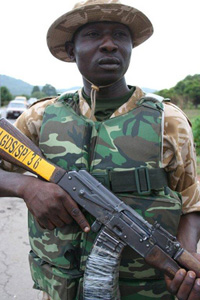What has been the position of ECOWAS on the crisis?
Founded in 1975 by the Treaty of Lagos, the Economic Community of West African States (ECOWAS) promotes sub-regional integration among its 15 members, and its protocols include a common approach to peace and security.
Ghanaian President John Atta Mills and Liberian President Ellen Johnson Sirleaf both saw at least some of the preparations for the elections or the actual voting in Côte d’Ivoire at first-hand, as did former Ghanaian President John Kufuor, working for the Carter Center. Theodore Holo, president of the high court of justice in Benin, headed an ECOWAS observer mission.
ECOWAS reacted quickly to the post-electoral breakdown in Côte d’Ivoire and came out firmly in support of Ouattara’s election. An extraordinary summit in Abuja on 7 December, attended by seven heads of state, formally endorsed Ouattara. The summit decided to suspend Côte d’Ivoire from all ECOWAS decision-making bodies and appealed to Gbagbo “to yield power without delay”, while condemning “the attempt to go against the will of the Ivorian people”.
Ten heads of state attended a follow-up summit in Abuja on 24 December, described Ouattara’s position as “non-negotiable”, and backed the imposition of sanctions against Gbagbo. The final communiqué warned of the possible “use of legitimate force” if Gbagbo refused to quit, while also announcing the formation of a high-level delegation to travel to Abidjan.
A key factor in deciding where Ecowas goes next will be the security of large communities from neighbouring states inside Côte d’Ivoire. Estimates vary, but regardless of identity documents and duration of stay in the country, hundreds of thousands of people are identified as Malians, Burkinabes, Guineans, Ghanaians, Senegalese and Nigerians. Nigeria has already had its embassy attacked because of its perceived pro-Ouattara stance. Resident communities, already exposed to violence and prejudice, will not want to run the further risk of being identified with an alien invasion.
Who are the ECOWAS mediators?
There have been unconfirmed reports that ECOWAS wanted to avoid naming mediators from states bordering Côte d’Ivoire. This ruled out the leaders of Ghana, Liberia, Mali, Burkina Faso and Guinea. Burkinabe leader Blaise Compaoré, seen as the main broker of the Ouagadougou Peace Agreement (OPA) in March 2007, had previously taken on a high profile mediation role but had signalled his own exhaustion and frustration in advance of the elections. Compaoré has been strongly identified in the past as an ally of Ouattara and accused of being a key mover behind the initial insurgency in Côte d’Ivoire in September 2002. Senegal’s Abdoulaye Wade is also widely viewed as partisan. His hosting of a visit by Ouattara in between the two rounds of voting was fiercely criticized by Gbagbo.
The three leaders designated by ECOWAS, Pedro Pires of Cape Verde, Ernest Koroma of Sierra Leone and Yayi Boni of Benin have all won elections judged to be reasonably free and fair. Like several other African heads of state, Gbagbo is the recipient of a major Beninois honour, the Croix de l’Ordre national du Bénin, and Boni has reportedly had good relations with Gbago in the past. But the Ouattara camp is more concerned about the role of Pires, highlighting Cape Verde’s links with Angola, Gbagbo’s most important ally in sub-Saharan Africa. Sections of the Ivorian press have accused Pires of diluting the message coming from President Goodluck Jonathan of Nigeria, the current ECOWAS chairman, taking a softer approach than his peers.
Who are the dissenting voices?
President Yahyah Jammeh of The Gambia has distanced himself from the ECOWAS position and did not attend either of the summits on Côte d’Ivoire, although The Gambia was represented. In a statement issued by his spokesman, Jammeh warned that ECOWAS had ignored the constitutional legality of Gbagbo’s victory “because of pressure from some Western powers whose vested interests in the natural resources of Côte d’Ivoire is an open secret”.
Former Ghanaian President Jerry Rawlings, now the African Union’s (AU) designated mediator in Somalia, has warned strongly against an ECOWAS military intervention, arguing that “attempts to marshal support for a military intervention lack any justification and rather will expose the UN, ECOWAS and AU as being hypocritical”.
What is the military capability of ECOWAS?
Ghana, Senegal, Togo, Benin and Niger all contributed troops to Ecoforce, the force deployed by ECOWAS in Côte d'Ivoire in 2003 after the Linas-Marcoussis peace accords signed by the government and Forces Nouvelles. Ecoforce troops were subsequently incorporated into the peacekeeping force established as part of the UN Operation in Côte d’Ivoire (ONUCI). While Ecoforce was handicapped by a late arrival, limited funding and logistical problems, the operation was seen to have learned from challenging past experiences in Liberia, Sierra Leone and Guinea-Bisssau. Until recently, the same five countries that made up Ecoforce had over 400 personnel in ONUCI serving in different parts of Côte d’Ivoire.
| More on the crisis |
Ghana, with a well-regarded professional army, has already warned it does not intend to intervene militarily in Côte d’Ivoire, citing important military commitments elsewhere.
In principle, ECOWAS has a 6,500-standby force to draw on, but its composition and structure is still not clear. Organizing an intervention faces difficulties in terms of logistics and funding, and external assistance could lend ammunition to the criticism that ECOWAS leaders were doing the bidding of other powers.
And even if Gbagbo is not the “legal” head of state, he still has control of a substantial military machine and considerable popular support.
ECOWAS military chiefs discussed contingency planning for an intervention in a meeting in Abuja on 28-29 December and are due to hold further planning sessions in Mali on 17-18 January.
cs/oa/cb
Sources: Carter Center, Modernghana, AFP, Panapress, Allafrica.com, United Nations Department of Peacekeeping Operations, Africa News, Office of the Gambian President State House
This article was produced by IRIN News while it was part of the United Nations Office for the Coordination of Humanitarian Affairs. Please send queries on copyright or liability to the UN. For more information: https://shop.un.org/rights-permissions





